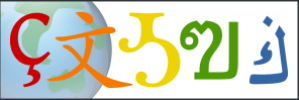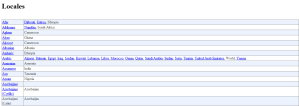 For MediaWiki, the CLDR or Common Locale Data Repository, is a primary source of information. The information about languages Unicode maintains in this standard is what is most relevant to us. It registers its name in English, as well as the autonym or the name in its own language, as well as information like what a date and a number look like, the script or scripts used for a language and the names of other languages in that language.
For MediaWiki, the CLDR or Common Locale Data Repository, is a primary source of information. The information about languages Unicode maintains in this standard is what is most relevant to us. It registers its name in English, as well as the autonym or the name in its own language, as well as information like what a date and a number look like, the script or scripts used for a language and the names of other languages in that language.
We prefer to use standardised information, not only because it is stable and reliable, but because we do not have to collect the data ourselves and also because the data is used by many other organisations and in many other applications. We love the CLDR and we want it to be even better. To make it better we need your help.
Many of the languages that have a Wikipedia and many of the languages that want to have a Wikipedia are not represented in the CLDR. Many Wikipedians know their language really well. They can provide the information about their language and they can verify that the existing information is correct. When there is a need to change things, you will need to create a user.
When a language is not yet supported, you will have to request for the new locale or language to be added. It is expected that you provide at least the core data when you make your request and that you at least complete the minimal data required. One of the questions is: where the language is official, it may be that a language does not have any official status. This does not prevent people from reading or writing that language and it does not mean that information about such a language is not important to us.
When a language is already supported, we want you to verify if the names for other languages exist and are correctly written. There can be issues in any language including English; using the Auracana name for the Mapundungun language is considered an insult.
When you are able and happy to help us in this way, you may be interested in joining our “language support team.” Because of your interest you belong to the group of people we first want to turn to when we have questions about supporting your language. More structured information and room for your reports can be found here. When there are any issues, do not hesitate to report them.
Thanks,
Gerard Meijssen
Internationalization / Localization outreach consultant

Can you help us translate this article?
In order for this article to reach as many people as possible we would like your help. Can you translate this article to get the message out?
Start translation
